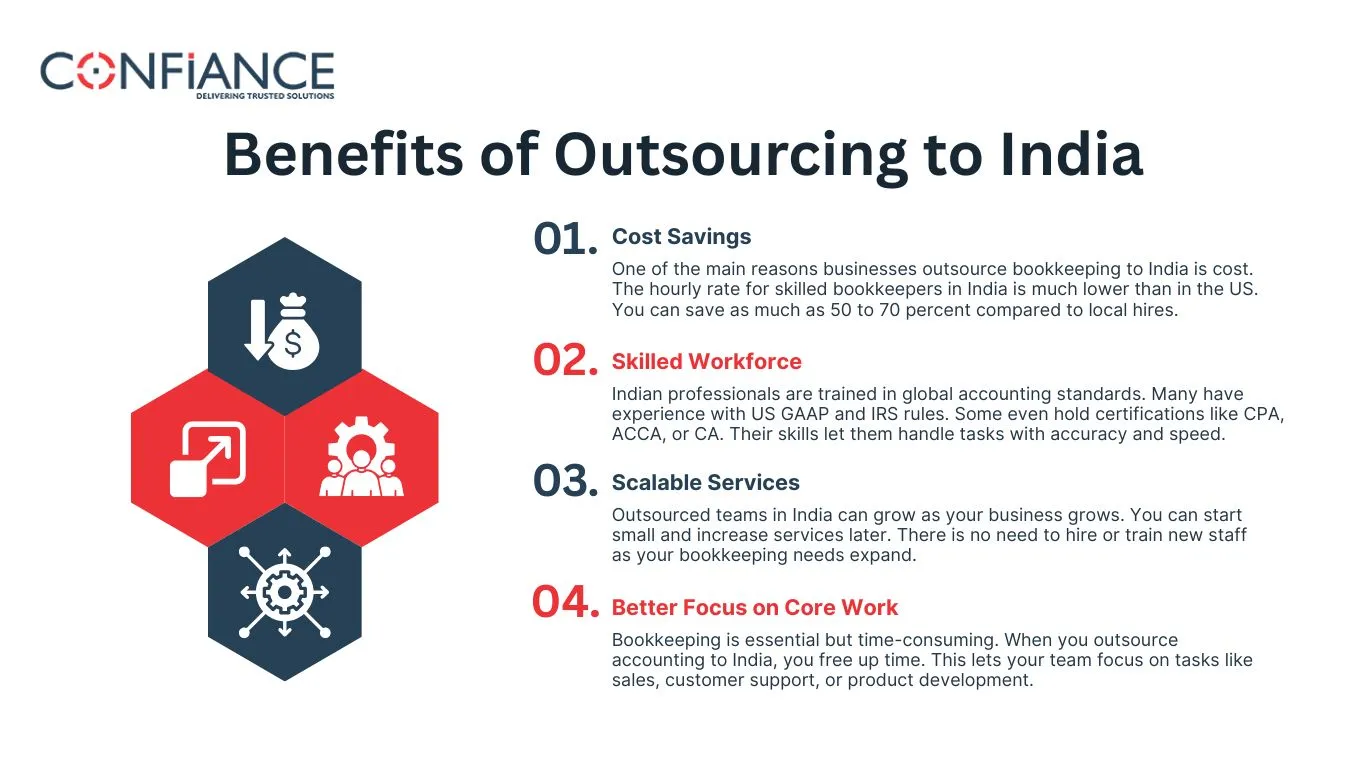
All You Need to Know Before You Outsource Bookkeeping to India
Outsourcing bookkeeping has become common for businesses that want accurate records without hiring a full-time team. India is one of the top choices for outsourced bookkeeping. Before you move your books overseas, there are a few important things you should know. This guide will help you understand what to expect when you outsource bookkeeping to India.
Why India for Outsourced Bookkeeping?
India has a strong base of trained accountants and bookkeepers. The country produces thousands of finance and accounting graduates each year. Many of them are familiar with US accounting rules. Their services are also more affordable, helping small businesses cut costs without lowering quality.
When you outsource accounting to India, you get a team that works across time zones. Many Indian firms operate during US business hours, so you can expect fast responses. Indian bookkeeping services often use cloud tools like QuickBooks, Xero, and Zoho, which keeps your data accessible and secure.
Services Offered When You Outsource Bookkeeping to India
Most Indian firms offer full-service bookkeeping. Here are the common services included:
- Recording day-to-day financial transactions
- Bank and credit card reconciliations
- Accounts payable and receivable tracking
- Payroll processing support
- Month-end and year-end reporting
- Financial statement preparation
- Tax-ready books
Some firms also provide extra support like inventory tracking, budgeting help, and cash flow analysis.
Benefits of Outsourcing to India
Cost Savings
One of the main reasons businesses outsource bookkeeping to India is cost. The hourly rate for skilled bookkeepers in India is much lower than in the US. You can save as much as 50 to 70 percent compared to local hires.
Skilled Workforce
Indian professionals are trained in global accounting standards. Many have experience with US GAAP and IRS rules. Some even hold certifications like CPA, ACCA, or CA. Their skills let them handle tasks with accuracy and speed.

Scalable Services
Outsourced teams in India can grow as your business grows. You can start small and increase services later. There is no need to hire or train new staff as your bookkeeping needs expand.
Better Focus on Core Work
Bookkeeping is essential but time-consuming. When you outsource accounting to India, you free up time. This lets your team focus on tasks like sales, customer support, or product development.
What to Consider Before You Outsource
Data Security
Your financial records are sensitive. Before choosing a provider, check how they manage data security. Look for:
- Secure file sharing and encryption
- Access controls
- NDA agreements
- Regular system audits
Ask if they comply with GDPR, SOC 2, or ISO standards. Cloud-based platforms with two-factor login add another layer of protection.
Communication Clarity
Even with skilled staff, communication can break down. Make sure your outsourced team understands your needs. Test their English fluency and accounting knowledge before you sign up. Ask how they manage questions, reports, and updates.
A clear point of contact should be assigned to your account. You should not have to repeat instructions or deal with delays due to poor communication.
Time Zone and Availability
India is 9 to 12 hours ahead of most US time zones. This can be a benefit if you plan right. Tasks assigned at night can be ready by the next morning. But it only works if the firm offers real-time support when needed.
Ask if they provide service during US hours. Confirm how quickly they respond to emails or calls.
Software Compatibility
Before you outsource bookkeeping to India, confirm the software they use. Most Indian firms are familiar with:
- QuickBooks Online and Desktop
- Xero
- Zoho Books
- Sage
- FreshBooks
- Microsoft Excel
Check if they can work on your platform or migrate data to another tool without issues. Also ask about backups, version updates, and user access.
Compliance Knowledge
Your outsourced team should understand US tax deadlines, reporting formats, and compliance needs. While they cannot offer tax filing services unless licensed in the US, they should prepare tax-ready books that make your CPA’s job easier.
Ask how they stay updated with changes in IRS rules or local tax laws. Check if they follow proper recordkeeping rules.
How to Find the Right Firm in India
Ask for Referrals
Start by asking other business owners if they work with a firm in India. Honest reviews from people you trust are more helpful than online ads.
Check Online Platforms
Websites like Clutch, Upwork, and GoodFirms list many providers. Look for high ratings, verified reviews, and experience in your industry.
Interview More Than One
Don’t stop at one option. Speak to at least three firms. Ask questions about:
- Years in business
- Staff experience
- Industry focus
- Service levels
- Sample reports
- Turnaround times
- Contract terms
Request a Trial Period
Most firms offer a short trial or a pilot project. Use this time to test their skills, speed, and communication. This will show you if the partnership will work in the long term.
Common Mistakes to Avoid
Going for the Cheapest Option
Cheaper is not always better. Some firms cut corners to keep prices low. They may use inexperienced staff or skip quality checks. You need value, not just savings.
No Written Scope
Always define what the service covers. A written scope avoids confusion. It should include tasks, deadlines, software used, and who does what.
Ignoring Legal Protections
Sign a clear agreement that includes NDAs, service levels, and data rules. It should also say what happens if either side ends the contract. This protects you from risk.
Not Reviewing Work
Even with a reliable team, you should review key reports and statements. You stay in control by checking numbers, asking questions, and giving feedback.
How Much It Will Cost
Cost depends on service size, complexity, and frequency. Here are common pricing options:
- Hourly rates range from $8 to $25
- Monthly fixed packages start around $200 for small businesses
- Custom plans may cost more if you need advanced reporting or CPA review
Get quotes from multiple firms and compare what each includes. Don’t choose based on price alone. Focus on quality, skills, and trust.
How to Get Started
Here is a simple step-by-step process:
- List Your Needs: Write down what you want help with. Include tools used, tasks to assign, and frequency.
- Shortlist Providers: Use referrals, reviews, and platforms to pick 3 to 5 firms.
- Schedule Calls: Interview each one. Ask for sample work and references.
- Start Small: Begin with a few tasks or a short-term trial.
- Review Regularly: Check reports weekly or monthly. Give feedback to improve service.
- Expand as Needed: Once the partnership works, you can hand over more work.
When you outsource bookkeeping to India, you can reduce costs, improve accuracy, and free up time. But success depends on choosing the right partner. Focus on experience, communication, security, and software skills. A clear agreement and regular checks will help keep things on track.
India remains a strong choice for small and mid-sized businesses looking to outsource accounting to India. With the right team, you can expect reliable service, fast delivery, and clear reports.
FAQs
- Is it legal for US companies to outsource bookkeeping to India?
Yes, it is legal. Many US businesses hire offshore firms for bookkeeping. Just make sure the provider follows US accounting rules and signs a proper contract. - Will I lose control over my financial data if I outsource?
No, you stay in control. You can set access limits, request regular reports, and review all entries. Good providers work under your direction. - Do I need to change my accounting software to work with an Indian firm?
Usually not. Most Indian firms work with major tools like QuickBooks, Xero, and Zoho. Always check compatibility before hiring. - What if I need to stop the service later?
You can end the service anytime if terms allow it. Make sure the contract has a clear exit process, including data handover. - Can I outsource only part of my bookkeeping work?
Yes. You can outsource tasks like reconciliations or accounts payable while keeping other tasks in-house. Most firms offer flexible plans. - How do I check the quality of work done by an outsourced team?
Ask for sample reports, review test work during a trial, and set regular check-ins. Also, compare their reports with your own records for accuracy.
